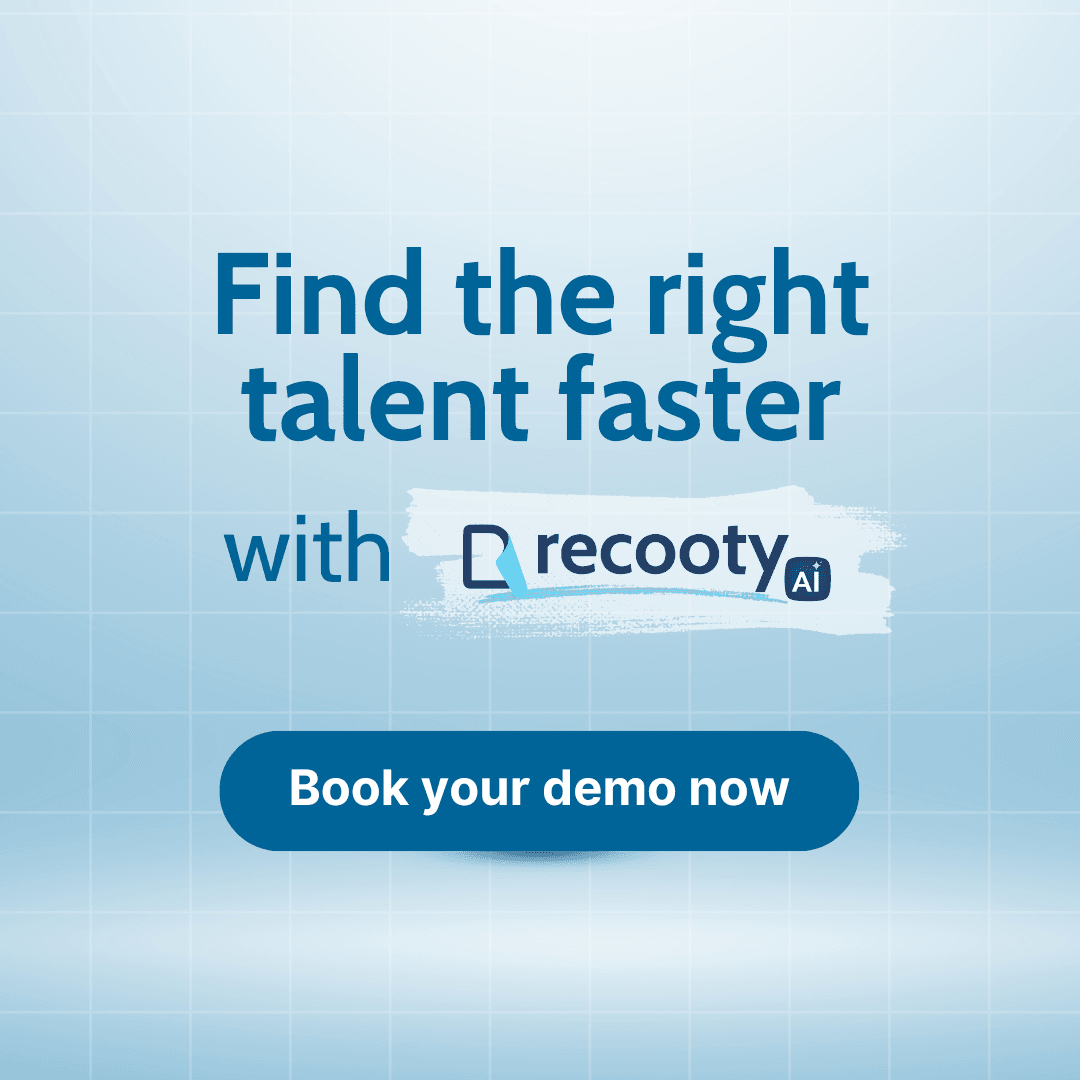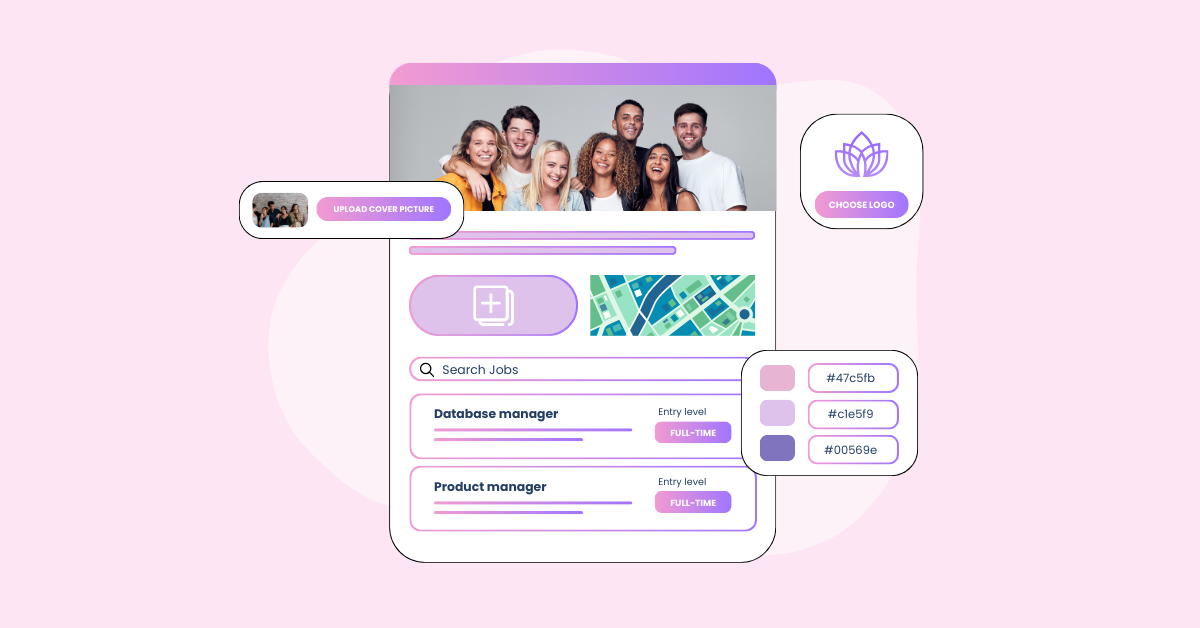
In today’s dynamic and fast-paced world of recruitment, staying ahead of the curve is essential. In a recruitment world that was already majorly driven by technology, the pandemic only pushed it more toward digitization. So, as we step into 2024 and beyond, businesses increasingly rely on sophisticated recruiting software to enhance their hiring processes.
From sourcing top talent to managing the entire recruitment process seamlessly, recruiting software offers a comprehensive solution. In this article, we’ll cover everything that you need to know about recruiting software along with a list of the top 14 recruitment software in 2024 & 2025. Let’s dive into the world of recruitment technology and discover the platforms shaping the future of talent acquisition.
What is Recruiting Software?
Recruiting software, also known as an applicant tracking system (ATS), is a technology solution that automates, simplifies, and streamlines the recruitment process. It helps businesses to efficiently manage the entire employee lifecycle, from sourcing potential candidates to onboarding new hires. It assists businesses to post job openings on various job boards, manage applicants, and hire new employees efficiently.
One thing to note here is that the term ‘recruiting software’ is an umbrella term under which there are various software solutions. These solutions have more or less the same purpose, but slightly different features, mainly differentiated based on the stages of the hiring process. We’ll be going over the main types of recruitment software that are widely used.
Types of Recruiting Software
Several types of recruiting software are available in the market today, each with unique features and benefits. By implementing the right solution, companies can optimize their recruitment process, save time and money, and hire the best candidates faster.Let’s explore some essential types of recruiting software that improve the hiring process :
- Job Board Tools and Job Aggregators: These platforms act as search engines, showcasing job openings. They help attract candidates by promoting job listings through job postings, talent communities, and social media.
- Applicant Tracking Systems (ATS): This is the most popular and widely used type of recruitment software. An ATS software manages the entire recruitment flow, from posting job openings to candidate selection. It assists in tracking applicants, managing resumes, and organizing communication with candidates. ATS tools are a must-have for efficient recruitment. Here’s a list of the Top 20 Applicant Tracking Systems to help you choose the best one for your business.
- Candidate Relationship Management (CRM) Systems: CRMs focus on building and maintaining relationships with potential candidates. They help recruiters engage with passive candidates, nurture talent pools, and stay connected with potential hires.
- Recruitment Marketing Platforms: These tools enhance employer branding and candidate engagement. They enable targeted communication, personalized content, and effective recruitment campaigns.
- Assessment and Testing Tools: These tools evaluate candidates’ skills, knowledge, and personality traits. They include coding assessments, cognitive tests, and behavioral assessments.
Onboarding Software: Once a candidate is hired, onboarding software ensures a smooth transition into the organization. It handles paperwork, training, and orientation processes
Top Features of Recruiting Software
Recruiting software has gained immense popularity due to its ability to streamline the complex and time-consuming recruitment process. These tools assist employers in finding, evaluating, and selecting high-quality job applicants. Let’s delve into the key features of recruiting software:Reporting: Reporting functionalities generate insights from recruitment data. Metrics such as time-to-fill, source effectiveness, and diversity statistics are essential for process optimization. Customizable dashboards allow recruiters to monitor performance and identify areas for improvement. Build Talent Pool: A talent pool consists of potential candidates who may not be suitable for current openings but could be valuable in the future. Recruitment software helps build and maintain talent pools by categorizing candidates based on skills, experience, and interests. When new positions arise, recruiters can tap into this pool for quick hiring. Career Websites: Career websites serve as a company’s virtual recruiting hub. Integrated with recruitment software, they showcase job listings, company culture, and employee testimonials. A well-designed career website attracts top talent and reinforces the employer brand. Interview Scheduling: Interview scheduling tools simplify the coordination of interviews. Recruiters can send automated invitations, sync calendars, and manage time zones. Efficient scheduling ensures a smooth candidate experience.
- Job Posting: Job posting functionality allows recruiters to create and distribute job openings across multiple platforms, such as company websites, job boards, and social media. It streamlines the process of advertising vacancies and ensures that job descriptions reach a wider audience.
- Candidate Sourcing: Candidate sourcing involves identifying and attracting potential candidates for open positions. Recruitment software assists in sourcing by aggregating resumes from various sources (such as databases, social networks, and referrals). It may also include AI-driven tools that match candidate profiles with job requirements.
- Applicant Tracking: Applicant tracking systems (ATS) manage the entire recruitment process. They organize candidate data, track application progress, and facilitate communication between recruiters and applicants. ATS features include resume parsing, interview scheduling, and automated email notifications.
- Candidate Management: Candidate management tools centralize candidate information. Recruiters can view profiles, track interactions, and collaborate with team members. These systems ensure a seamless experience for candidates throughout the hiring journey.
- Efficient Communication: Effective communication is crucial during recruitment. Software platforms offer features like automated emails, interview reminders, and real-time chat. Clear communication enhances candidate engagement and improves the overall recruitment process.
- Resume Parsing: Resume parsing extracts relevant information from resumes and converts it into structured data. It saves time by automatically populating candidate profiles with details like work experience, education, and skills. Accurate parsing ensures consistency and reduces manual data entry errors.
- Candidate Evaluation: Candidate evaluation tools help assess applicants objectively. Features include customizable evaluation criteria, scoring, and feedback collection. Recruiters can collaborate with hiring managers to make informed decisions.
Benefits of a Recruiting Software
Recruiting software is an essential tool for modern businesses that want to streamline their hiring process. Here are some of the top benefits of using recruiting software:
- Increased Efficiency: Recruitment software streamlines the hiring process, automating tasks like background checks, candidate screening, and interview scheduling. This efficiency allows recruiters to focus on high-value activities, ultimately reducing the time spent on filling vacancies.
- Automates and Optimizes the Hiring Process: By automating repetitive tasks, such as managing communication and interview scheduling, recruitment software frees up valuable time for recruiters. It ensures a smoother, more organized process from sourcing candidates to making offers.
- Positive Candidate Experience: A well-implemented recruitment system provides a seamless experience for candidates. Clear communication, timely updates, and user-friendly interfaces contribute to a positive impression of your organization, even for applicants who may not ultimately be hired.
- Customizable Hiring Pipeline: Recruitment software allows you to tailor your hiring workflow to match your organization’s unique needs. You can define stages, set criteria, and create a structured process that aligns with your company’s goals.
- Widens Reach: Online recruitment tools enable you to cast a wider net by posting job openings on various platforms, reaching a broader audience. This increased visibility attracts diverse talent and helps you tap into a wider pool of potential candidates.
- Enhances Hiring Quality: By automating initial screenings and assessments, recruitment software ensures that only qualified candidates progress through the pipeline. This leads to better matches between candidates and job roles, ultimately improving hiring quality.
- Improved Employer Branding: A well-organized and efficient hiring process reflects positively on your company. Candidates appreciate professionalism, transparency, and a smooth application experience, which contributes to a stronger employer brand.
- Better Retention Rates: Matching candidates to roles that align with their skills and preferences reduces turnover. Recruitment software helps identify the right fit, leading to improved employee satisfaction and longer retention.
- Reduced Time-to-hire: With streamlined processes, recruitment software significantly shortens the time it takes to fill open positions. Faster hiring means less strain on existing team members and better continuity in your workforce.
- Reduced Cost-to-hire: Efficient recruitment processes translate to cost savings. By minimizing manual efforts and speeding up hiring, you reduce expenses related to advertising, administrative tasks, and prolonged vacancies.
- Boosts Diversity: Recruitment software facilitates unbiased candidate evaluation and ensures fair treatment throughout the hiring process. This contributes to a more diverse workforce, fostering innovation and creativity.
Top 14 Recruiting Software
Now that we’ve covered what is recruiting software, its features, and its benefits, let’s dive deeper into the top 14 recruiting software that are leading the HR tech market because of their amazing features and functionalities.
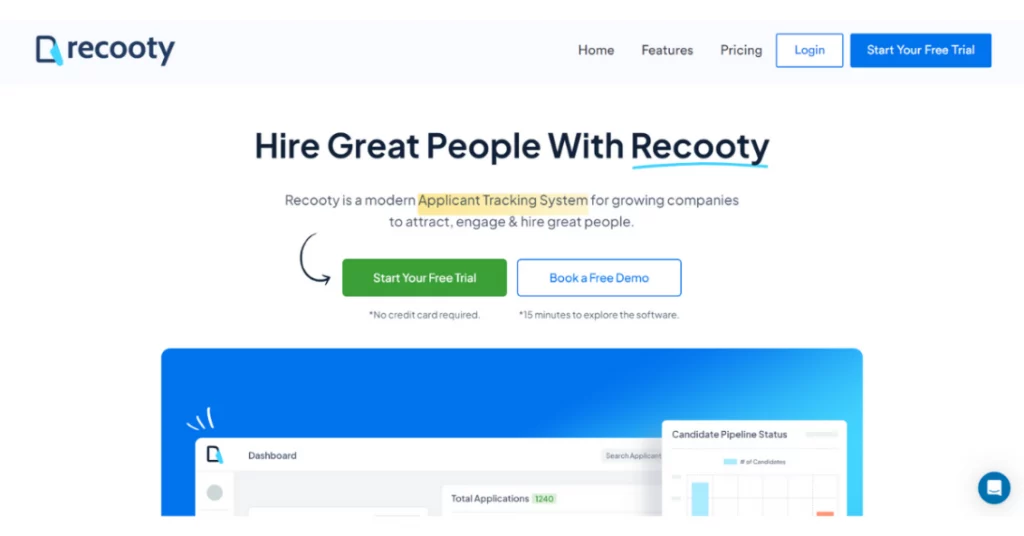
Recooty is a modern applicant tracking system (ATS) designed for growing companies and SMBs. It streamlines the entire recruitment process, from candidate sourcing to interview scheduling. With over 700 job description templates, Recooty helps you create compelling job posts and distribute them across relevant channels. It integrates with both free and paid job boards, your website’s careers page, and social media channels. The platform is easy-to-use, intuitive, and emphasizes collaboration, allowing hiring teams to work together efficiently. Recooty also offers customizable career pages and widgets for your website, enhancing your employer brand. Its AI-powered job description generator can help in generating effective JDs that attract top talent to your job postings. You can get a whole set of efficient features at a very affordable price. Whether you’re a small or medium enterprise, Recooty optimizes your hiring journey from start to finish.
2. Zoho Recruit
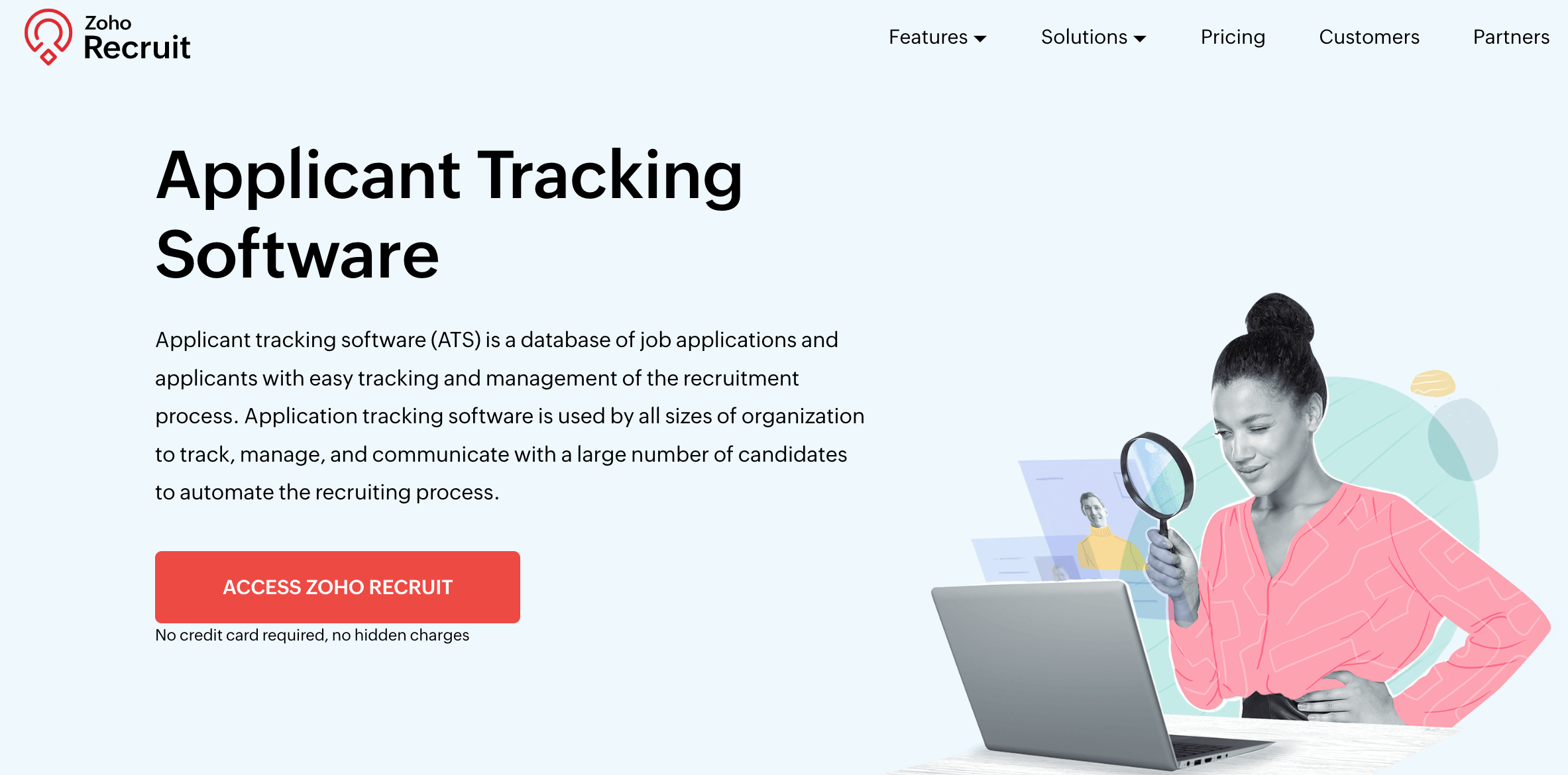
Zoho Recruit is an ATS recruitment software catering to staffing agencies and corporate companies. It simplifies the entire recruitment lifecycle, starting from candidate sourcing to interview scheduling. The platform eliminates manual data entry and traditional methods by centralizing all stakeholders—candidates, clients, and your recruiting team. Zoho Recruit integrates with premium and niche job boards, giving you an edge in candidate sourcing. Notable features include candidate engagement, hiring team collaboration, and high-volume efficiency. Customizable offer letter templates and AI-driven skills matching enhance the hiring process. Zoho Recruit ensures a seamless experience for candidates, making it easier for them to apply.
3. Zip Recruiter
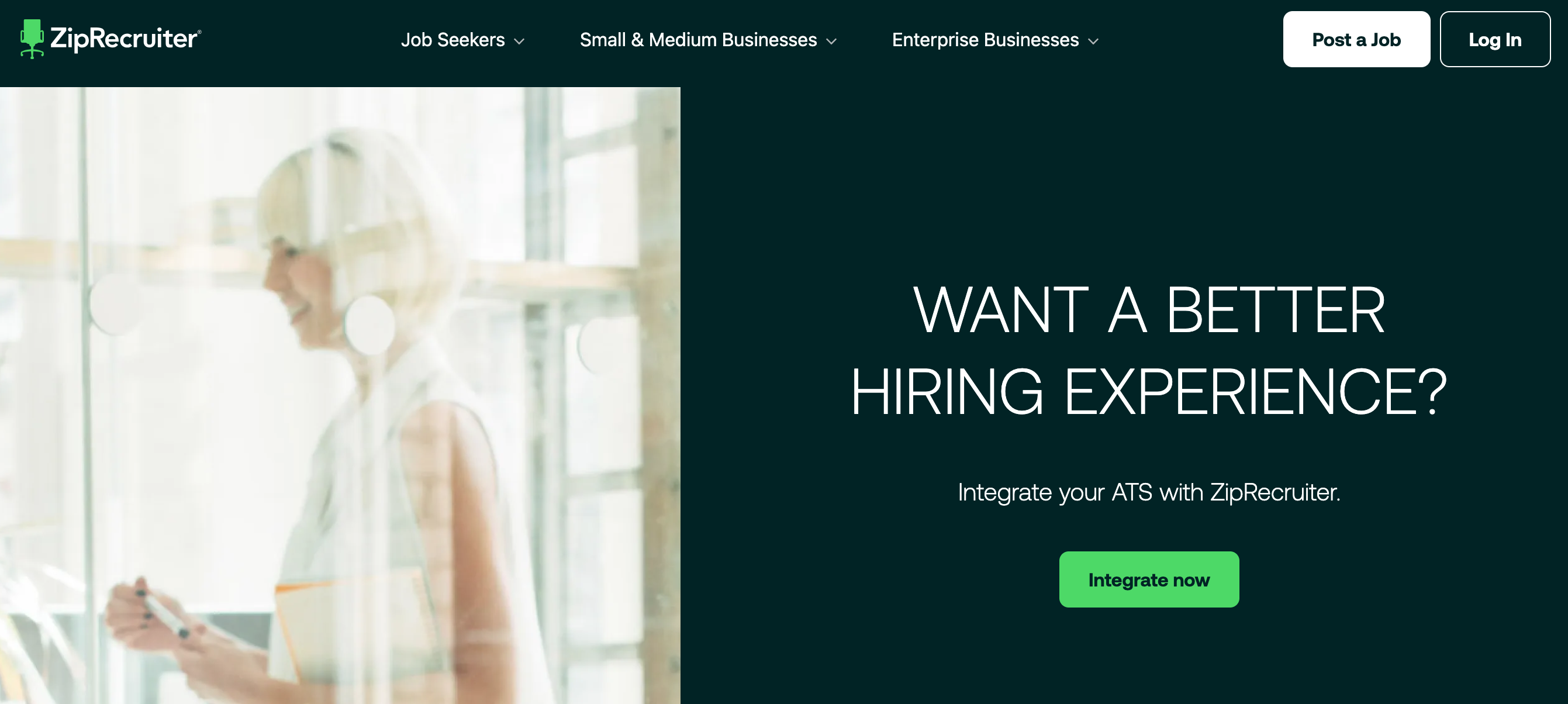
ZipRecruiter has been a prominent job board for over a decade, connecting more than 110 million job seekers with 2.8 million businesses. Its AI matching technology efficiently pairs candidates with job openings. The platform offers clear upfront pricing and a vast network of businesses and job seekers. While it’s excellent for high-volume hiring, it may be expensive for single job postings. ZipRecruiter provides features like resume search, candidate engagement, and a four-day free trial. The mobile app allows on-the-go job posting and candidate review
4. iSmartRecruit
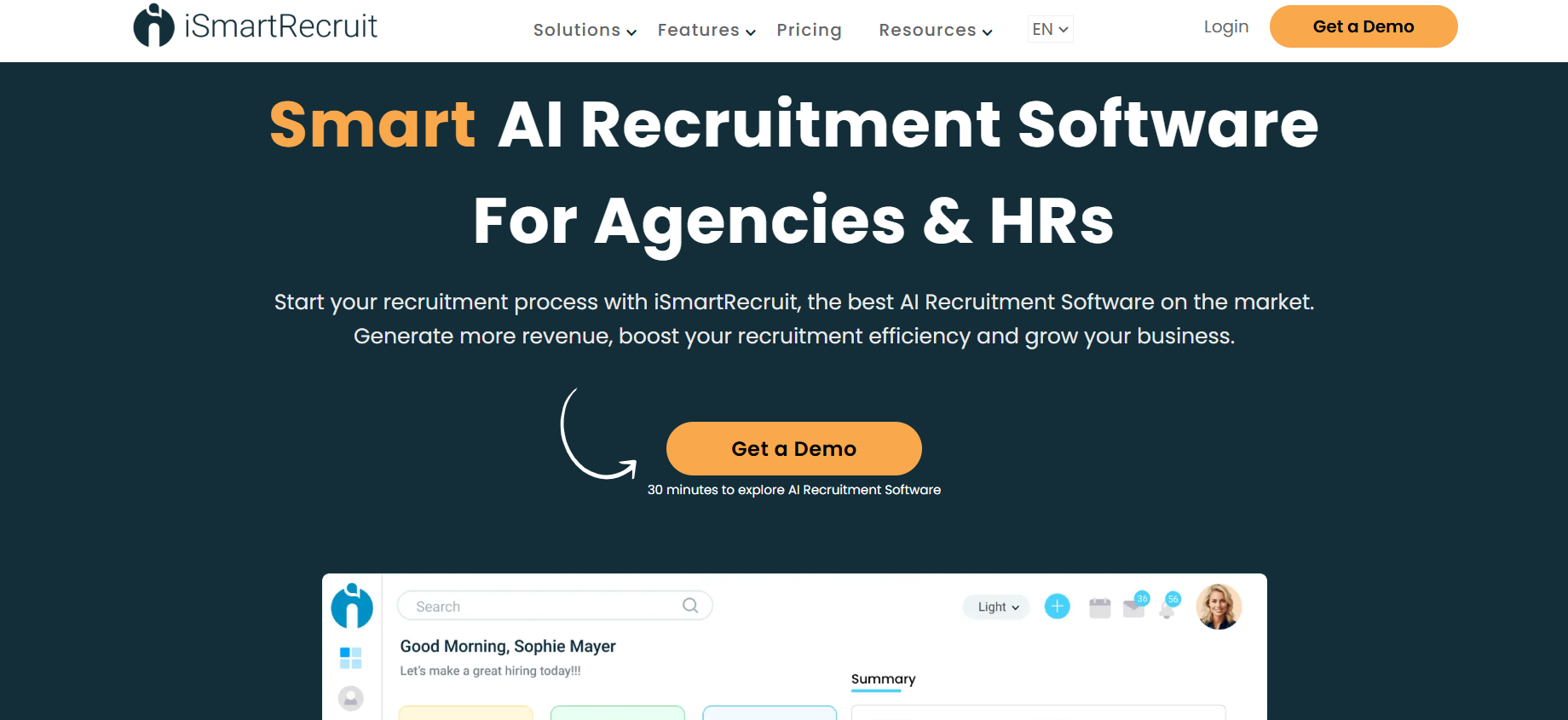
iSmartRecruit is a globally acclaimed Recruitment Software. Founded in 2013, iSmartRecruit has gained immense popularity for its cutting-edge features, such as AI-driven candidate matching, multilingual support, automated workflows, and seamless integrations with job boards and social media platforms. Catering to a wide range of industries and geographies, the platform is trusted by recruiters worldwide for its efficiency and ease of use. Recognized with top user ratings on Capterra, G2, and Sourceforge, iSmartRecruit is a leading choice for recruitment agencies, Executive Search Firms, HR teams and Enterprises aiming to streamline their hiring journey.
5. factoHR
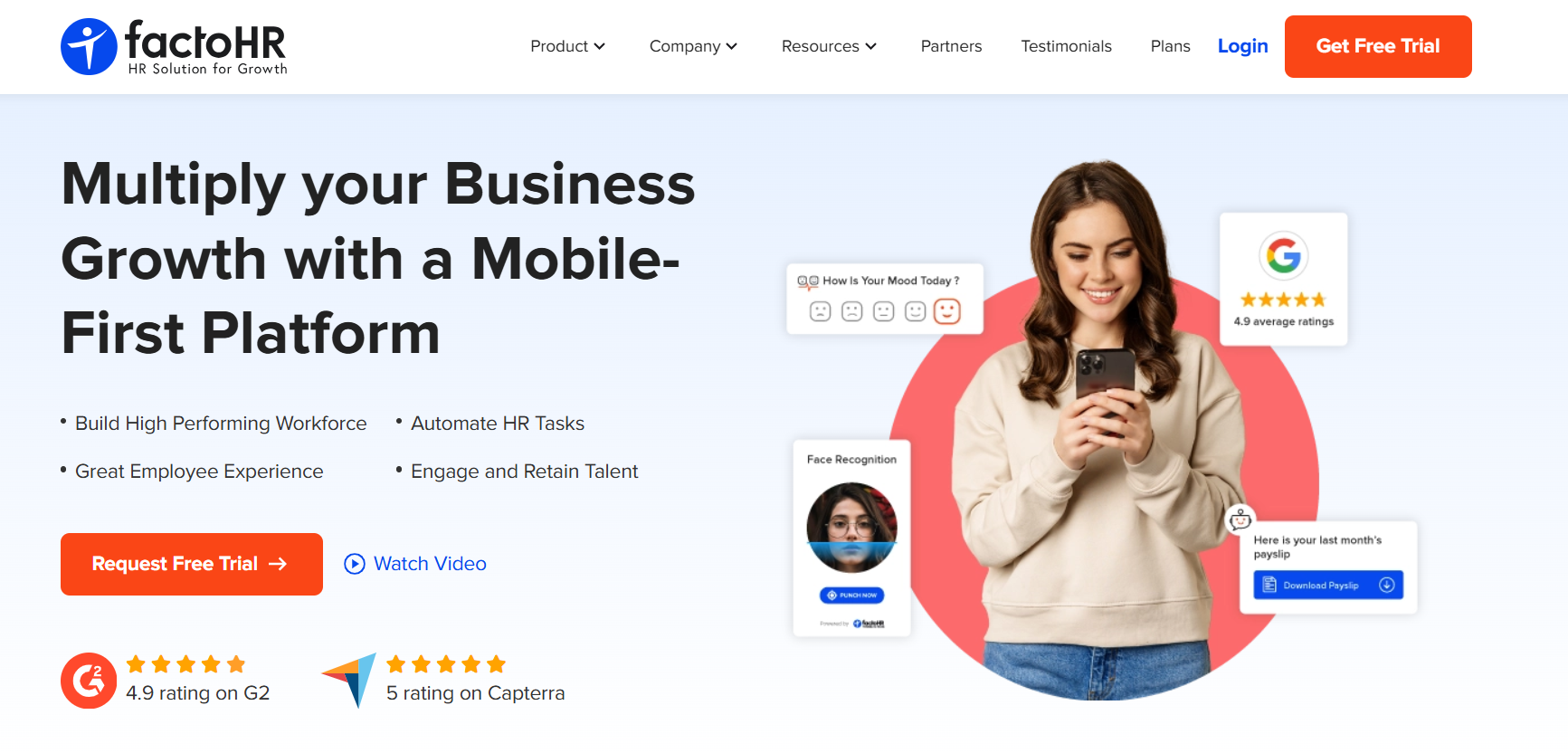
factoHR is a cloud-based HRMS and payroll solution that helps businesses of any size manage everything from attendance tracking and leave requests to payroll and compliance, all in one place. Automating day-to-day tasks reduces errors and saves time for HR teams. Employees can mark attendance, view payslips, and request leave through the mobile app, which makes staying on top of work much easier. The platform also offers performance management tools like goal setting and reviews to boost engagement. Thanks to frequent compliance updates and secure data handling, HR professionals can work with confidence.
6. Bamboo HR
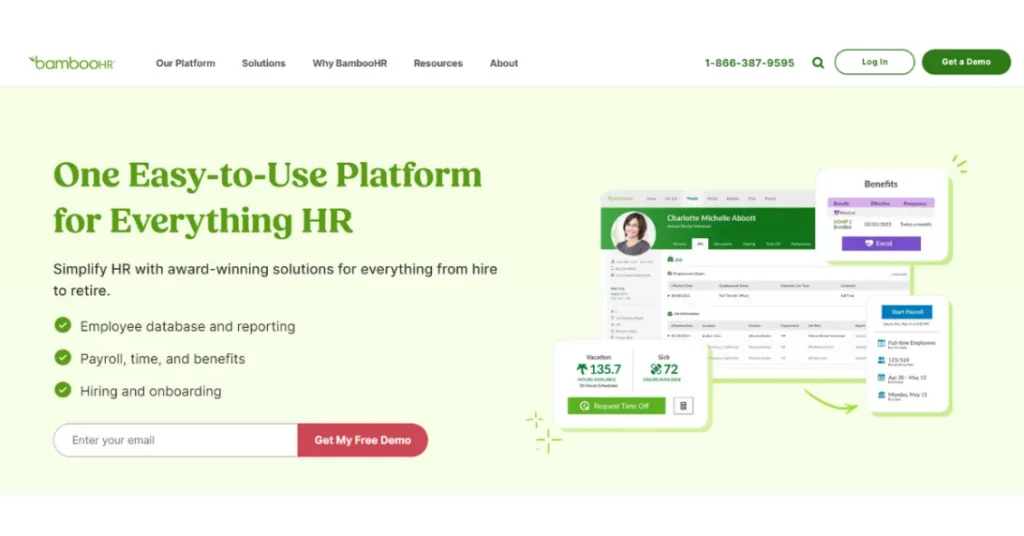
BambooHR’s recruiting software simplifies the hiring process. It keeps applicant information organized, from sourcing to offer letters. The platform ensures timely communication, creating a positive candidate experience. Collaborating as a team is easy, with custom permissions and automatic alerts. Evergreen requisitions help build candidate pipelines, and AI-driven skills intelligence enhances decision-making. BambooHR’s mobile app enables recruiters to review resumes and manage candidates from anywhere. It’s a comprehensive solution for efficient and personalized hiring.
7. Workday Recruiting
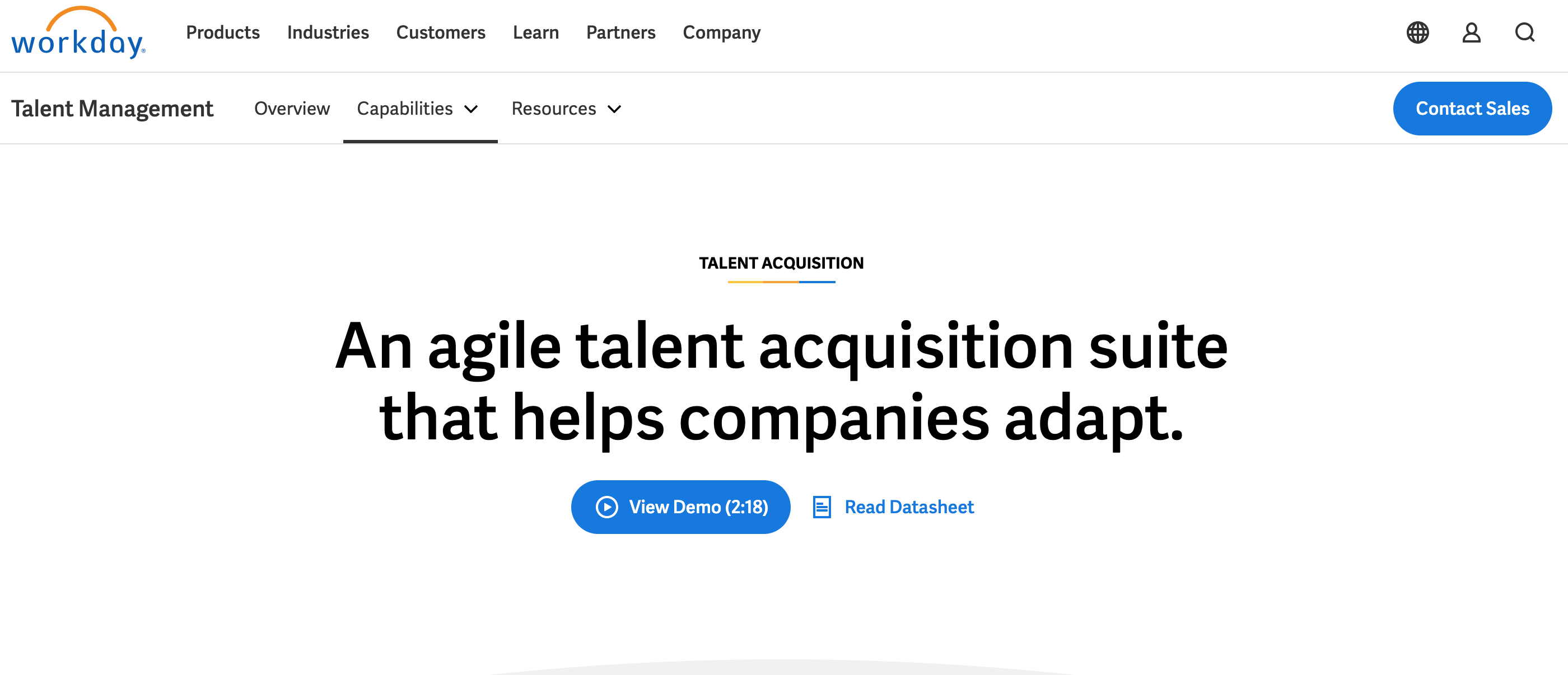
Workday Recruiting unifies recruiting, engagement, and skills intelligence with Workday HCM. It covers the entire talent acquisition lifecycle, emphasizing collaboration among hiring teams. Its evergreen requisitions, automated workflows, and real-time insights streamline hiring. The platform offers a personalized candidate experience, AI-driven job recommendations, and easy application processes. Workday’s centralized hub empowers recruiters, ensuring a seamless journey from application to the offer letter. The mobile app allows on-the-go hiring.
8. Workable
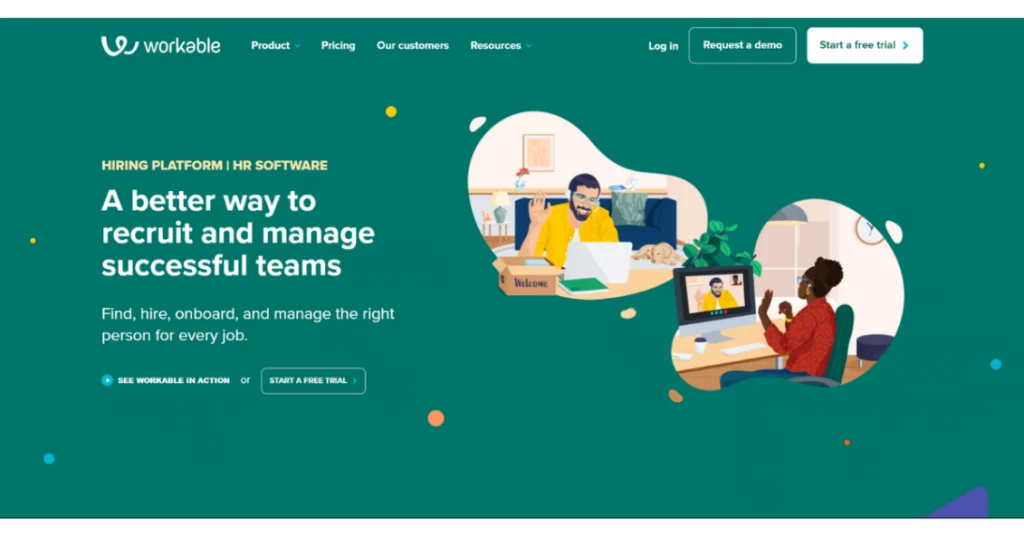
Workable is a comprehensive talent acquisition software that goes beyond mere applicant tracking. It serves as an all-in-one hiring platform, enabling teams to find candidates, evaluate applicants, and make informed hiring decisions without any hassle. Workable streamlines the entire recruitment process, while ensuring that employers get qualified candidates for their job openings. Not only does it allow you to post jobs and attract candidates, but it also offers customizable hiring workflows and processes. The platform integrates with various job boards, ensuring broad visibility for your job postings. Automation is a key feature, enhancing efficiency by handling repetitive tasks. Workable’s mobile app keeps you connected even when you’re on the move.
9. GreenHouse
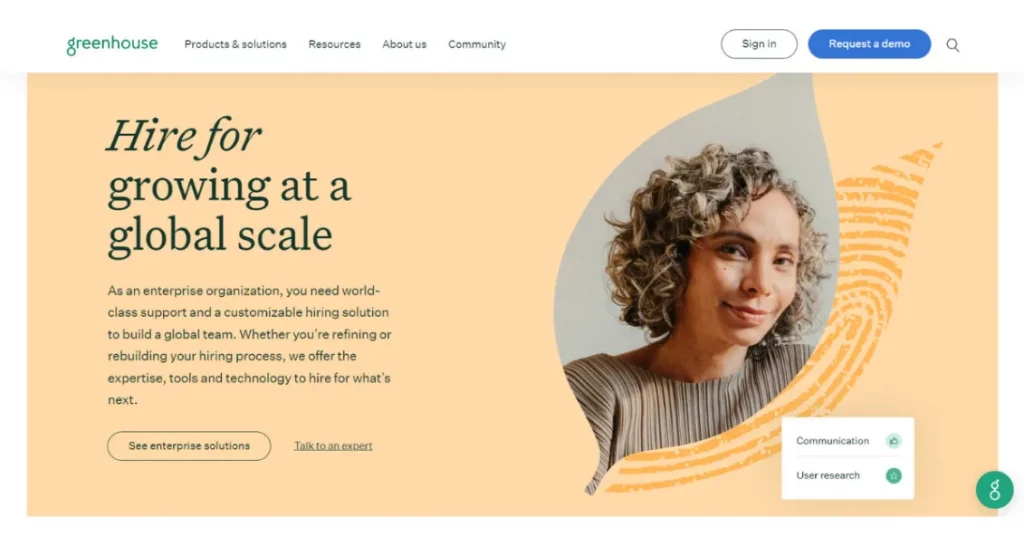
GreenHouse stands out as an applicant tracking system (ATS) and hiring platform that empowers organizations to transform their recruitment process. It covers the entire hiring lifecycle, from sourcing qualified talent to onboarding newly hired employees. GreenHouse’s scalable workflows support every step, ensuring seamless candidate management. Beyond being an ATS, it acts as a central hub for your recruitment stack. Customizable hiring workflows, automated tasks, integrations, and compliance training are among its top features. GreenHouse simplifies onboarding, keeps employees up to speed, and engages your workforce. It’s a powerful tool for modern recruitment.
10. Smart Recruiters
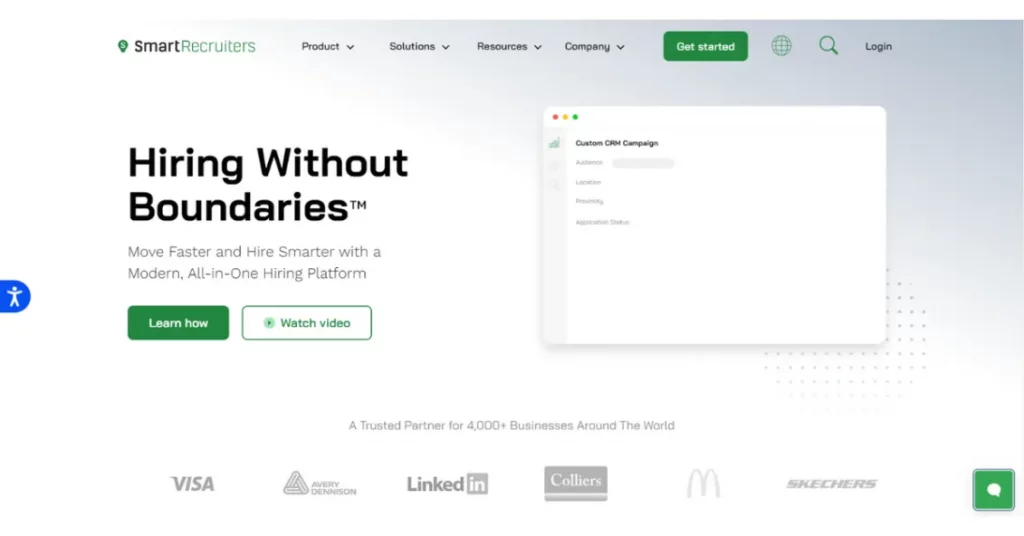
Smart Recruiters is a comprehensive talent acquisition suite designed for modern recruitment needs. Its core product, Smart Recruit, offers an easy-to-use interface with built-in features such as recruitment marketing, applicant tracking, candidate evaluation, and job offer tools. It caters to businesses of varying sizes and integrates seamlessly with 350+ pre-integrated recruitment solutions. Additionally, Smart Recruit provides 200+ job boards for global distribution. The platform is compliant with GDPR and privacy regulations, ensuring data security. Pricing depends on your customized bundle and the number of employees in your organization. The add-ons include Smart CRM, SmartJobs, SmartPal (conversational AI), SmartAssistant (native AI), SmartMessage (SMS & WhatsApp communication), SmartConnect (integrations), and SmartGlobal (contract management for job distributions).
11. Rippling
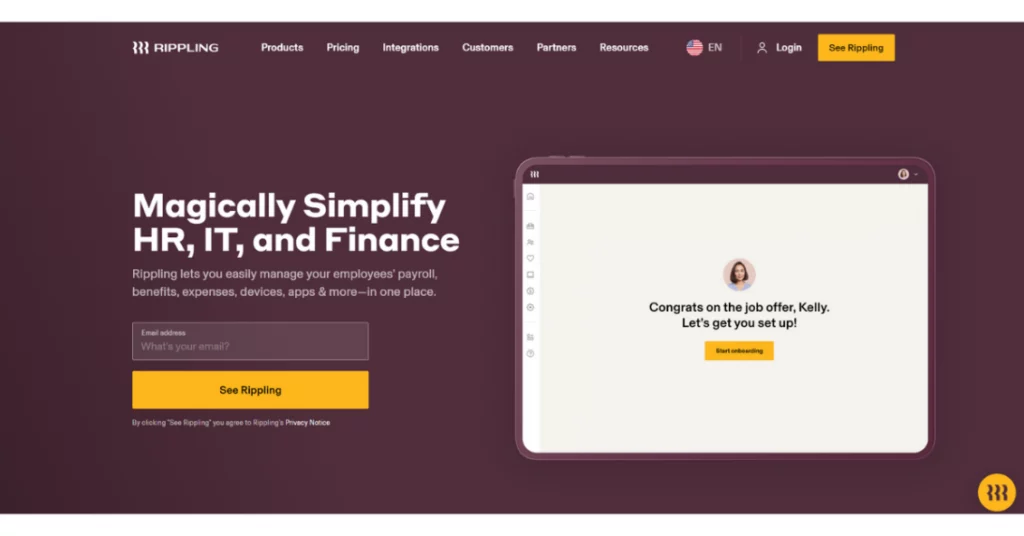
Rippling is an all-in-one HR software solution suitable for teams ranging from two to over 2,000 employees. Its features include an applicant tracking system (ATS), full payroll and benefits management, time and attendance tracking, learning management, and professional employer organization (PEO) services. Rippling’s user-friendly interface allows easy setup and customization. The pricing model is flexible, with options like the Startup Plan (starting at $189/month) offering candidate automation, background screening integrations, customizable pipeline stages, live video meetings, and real-time analytics. The Bootstrap Plan is free and provides basic recruitment features, while the Pro Plan (starting at $420/month) includes additional features like multiple recruiting pipelines and advanced visual reporting.
12. Bullhorn
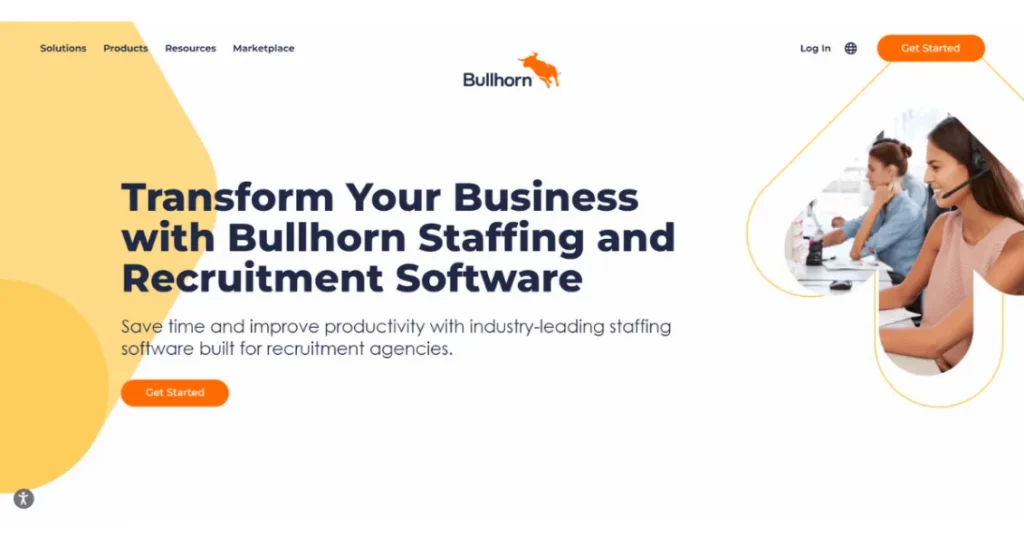
Bullhorn combines unlimited customization with an attractive user interface (UI) all at a very affordable price. The system centralizes activities, making it an excellent choice for businesses. Bullhorn offers solutions for every part of the recruiting life cycle, including applicant tracking, candidate pools, and approvals. Its app store allows integration with popular tools like Slack, Zoom, and Salesforce. The pricing structure is based on a pay-per-user-per-month model, with plans ranging from basic functionality to premium features. Enterprise packages are also available with volume discounts and additional resources.
13. Jazz HR
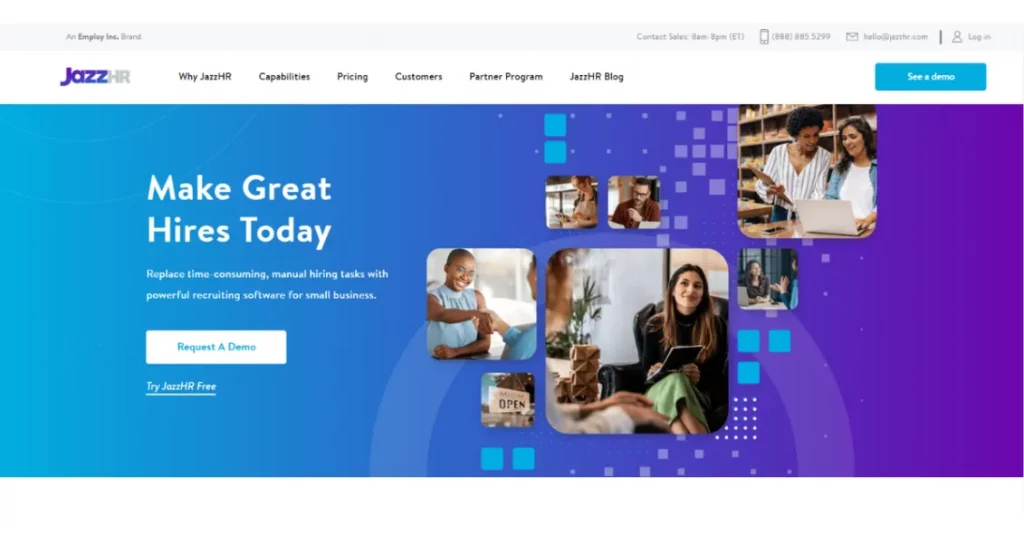
JazzHR is a powerful and user-friendly recruitment and applicant tracking software (ATS) that scales a business’ ability to find and hire great talent. By automating and optimizing the entire hiring process, JazzHR enables companies to save time, make informed hiring decisions, and reduce overall recruiting costs1. Designed specifically for small and growing businesses, JazzHR streamlines recruiting efforts by centralizing candidate information, automating repetitive tasks, and ensuring better competitiveness in attracting top candidates. With unlimited jobs and users, it offers flexibility and ease of use, making it an ideal solution for SMBs. Whether you’re posting job listings, managing candidate pipelines, or collaborating with your hiring team, JazzHR provides robust functionality across the entire recruiting process.
14. Breezy HR
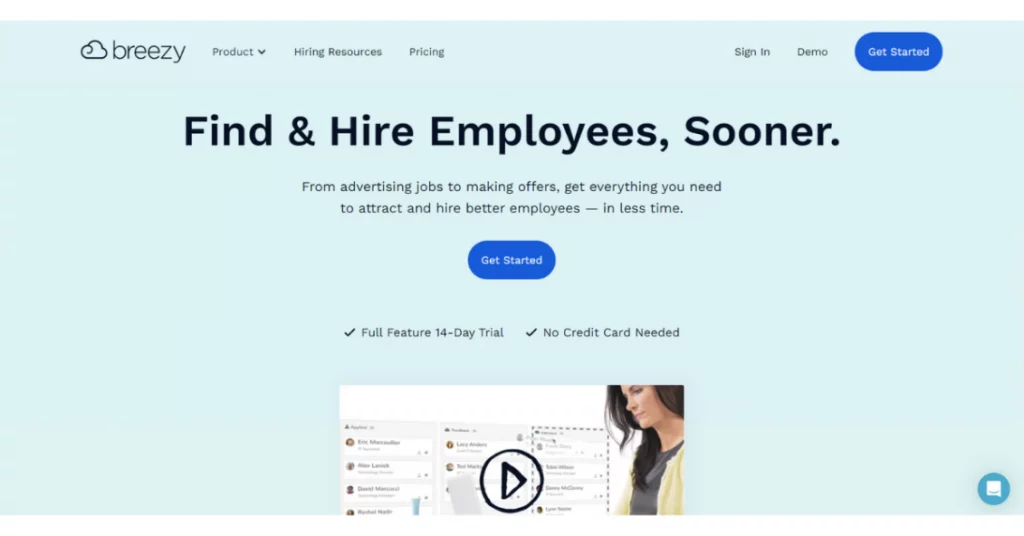
Breezy HR is a modern hiring software and applicant tracking system (ATS) that streamlines the recruitment process. From advertising job openings on 50+ top job sites to automating repetitive tasks like pre-screening candidates and scheduling interviews, Breezy helps attract and hire quality employees efficiently. Its user-friendly interface allows customization of career sites, and it offers easy-to-use offer management and HRIS integrations. Over 17,000 companies have chosen Breezy to optimize their hiring process, making it a popular choice for businesses of all sizes.
How to choose the Best Recruiting Software?
Now that we’ve covered the best recruiting software, the biggest question that stands is – how to choose the best recruiting software? Don’t worry, we’ve got you covered. Here are some of the important things to consider while choosing the best recruiting software for you –
1. Analyze Your Company Needs – Before diving into the vast array of recruiting software options, take a step back and assess your organization’s specific requirements. Consider the following factors:
Company Size – Are you a small startup, a mid-sized company, or a large enterprise? The software you choose should align with your team size and scalability needs.
Recruitment Strategy – Understand your recruitment workflow. Do you focus on active sourcing, passive candidate engagement, or a combination of both?
Budget – Determine your budget constraints. Some solutions offer robust features but come at a higher cost, while others provide cost-effective options.
2. Prioritize Essential Features – We’ve already outlined some of the most important features of recruiting software. However, not every feature will be suitable for every business. So, you need to look for the essential features when evaluating recruiting software that are suitable to your needs. Some of the most essential features almost every business needs are :
Applicant Tracking System (ATS) – An efficient ATS helps manage candidate pipelines, track applications, and streamline communication. Look for features like resume parsing, interview scheduling, and customizable workflows.
User Interface (UI) and User Experience (UX) – A user-friendly interface ensures smooth navigation for both recruiters and candidates. Test the software for overall functionality and user-friendliness before committing to a purchase.
Integration Capabilities – Consider how well the software integrates with your existing tools (e.g., HRIS, CRM, job boards). Seamless integration enhances efficiency and data accuracy.
Comprehensive Analytics – Data-driven decisions are essential. Look for reporting and analytics features that provide insights into your recruitment performance. Metrics like time-to-fill, source effectiveness, and candidate quality matter.
Customer Support – Reliable customer support is crucial. Ensure the software provider offers timely assistance when needed.
3. Ready-Made vs. Custom Solutions – Decide whether you want an off-the-shelf solution or a custom-built one. Ready-made software is quicker to implement, while custom solutions cater specifically to your unique needs. Having said that, a majority of recruiting software usually provides both types, ready-made, and custom solutions based on the company’s needs. However, pricing may differ significantly based on the functionalities.
4. Analyze ROI – One of the most important things to consider is the return on investment (ROI) of the recruiting software. To evaluate the ROI, you can analyze outcomes such as reduced time-to-hire, improved candidate experience, and streamlined processes. Also, you can keep a note of the quality of candidates you’re hiring for your open job roles to understand the matching capabilities of the recruiting software.
Frequently asked questions
The best software for recruitment depends on your specific needs, but popular options include Recooty, Workday, Greenhouse, and Lever.
The platform best for recruitment varies based on factors like industry, company size, and budget, with options ZipRecruiter, Breezy HR, and Recooty being popular choices.
The best CRM for recruitment often includes platforms like Manatal, Thryv, and Teamtailor offering customizable solutions for managing candidate relationships and workflows.
ATS (Applicant Tracking System)recruitment refers to software used by businesses to manage the recruitment process, including job postings, applicant tracking, and candidate communication, streamlining hiring workflows for efficiency and organization.



